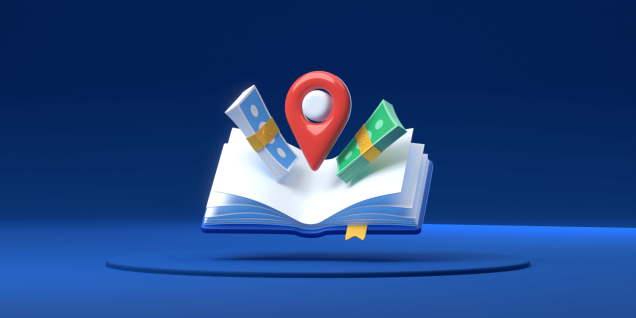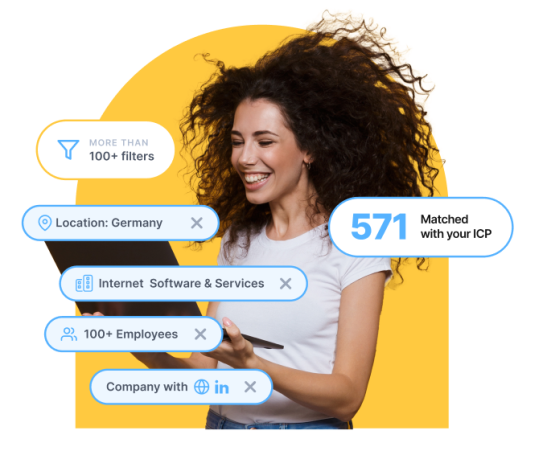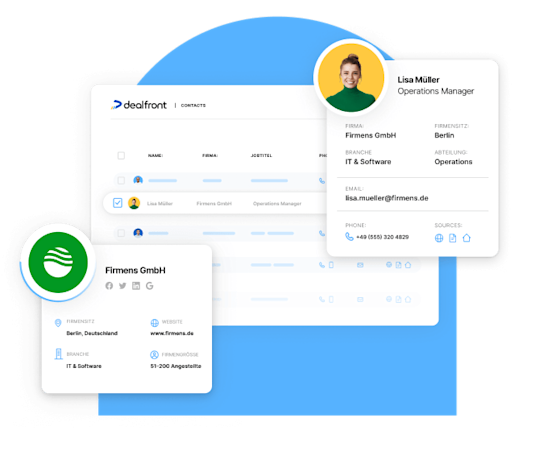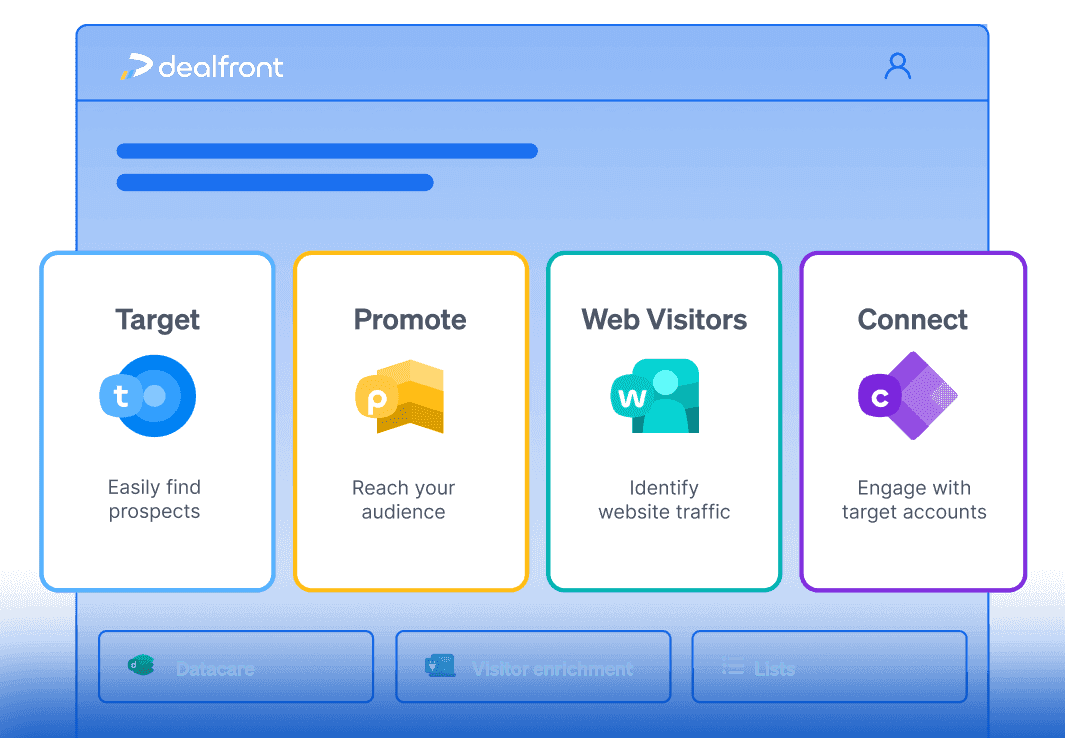Buying B2B addresses is a common practice to accelerate sales efforts. But not all sales and marketing data is created equal, and there are critical factors to consider when acquiring B2B email and address lists.
B2B addresses are essential for cold outreach, direct mail campaigns, social selling and advertising on platforms like LinkedIn.
While there are many data providers online, not all offer data accuracy or GDPR-compliant data. Fortunately, with the rise of digital tools and Sales Intelligence, there are smarter ways to obtain B2B addresses.
Here’s what you need to know to buy B2B addresses safely and effectively.
Top 6 reasons to buy B2B addresses
There are many good reasons to buy address data. The benefits are clear: having the correct company address, the right contact person or decision-maker, along with their telephone number and business email address, makes it much easier and more personal to reach out to potential prospects in your B2B sales efforts or email marketing campaigns.
Below, we look at the top six reasons why buying B2B addresses is worth the investment.
1. Speed up new customer acquisition
Finding new customers is challenging and time-consuming. By purchasing B2B contact information, like email and postal addresses, lets you skip the hours of research needed to identify potential leads, saving you valuable time and resources. Concerned about costs? Compare the expense of B2B contact data lists to the hours you'd spend on manual research, and the value becomes clear.
2. Expand your customer base and sales territory
Even if you have a well-established customer base and a strong sales pipeline, there’s always room to grow. Buying B2B data lists gives you access to a broader range of potential clients, including companies you might not have considered or discovered through your existing networks. This approach can help you reach new markets and expand your business footprint.
It’s important to note that while buying addresses can offer these benefits, investing in Sales Intelligence can provide even greater advantages. Sales Intelligence tools go beyond simple address lists, offering deeper insights and more accurate data, which we’ll explore further below.
3. Gain even deeper market insights with B2B databases
When you buy a full B2B database along with a list of addresses, you gain even more valuable insights into your target market. Sales Intelligence tools, for example, allow you to understand the demographics, size and scope of potential partners, analyze competitors and identify key trends—all with just a few clicks. This deeper level of market understanding can give you a significant edge in your sales and direct B2B marketing campaigns.
4. Use trigger events for targeted marketing campaigns
With detailed datasets or, even better, a comprehensive online database, you can tailor your marketing efforts more precisely.

Sales Intelligence tools (the automated alternative to buying addresses) enable you to identify trigger events, such as a change in management at a potential client’s company, allowing you to time your outreach perfectly. These tools provide you with the ideal opportunity to engage with prospects when they’re most likely to be receptive, giving you a competitive advantage. They also allow you to fine-tune your selection criteria to ensure you're reaching the right audience.
5. Minimize campaign waste with precise B2B addresses
Campaign waste happens when your marketing efforts target audiences that aren’t a good fit for your products or services. While some level of waste is inevitable, too much can lead to inefficient use of resources. By purchasing B2B addresses that align with your Ideal Customer Profile (ICP), you can significantly reduce this waste and ensure that your campaigns are focused on the right audience. This is especially true for telemarketing efforts where precision is crucial for success.
6. Refine your buyer personas through address data analysis
In contrast to an ICP, a buyer persona does not directly define your ideal customer, but rather the buyer of your product within a company. Before purchasing addresses, you should know your ICP to obtain effective company addresses.
If you have an address list, contact database or Sales Intelligence tool that offers a variety of filtering methods, you can then further refine your buyer persona. Who in the company is most likely to be interested in your offering? Who is involved in the purchasing decision? Sales Intelligence tools can also significantly help you define your buyer persona—and your ICP—as precisely as possible.

Where can you buy high-quality B2B address data?
There are multiple options for buying B2B addresses, but not every option provides the quality data that your sales and marketing teams need. Below, we give you an overview of the most common sources and our recommendations.
The classic approach: Buying from address brokers
The traditional method is purchasing through an address broker or a B2B address database. In this process, you select your industry and often a location, and you receive a catalog of company addresses. Depending on the provider and price, the information included can vary in detail. Typically, for your investment, you get:
the company name,
the address, and sometimes
the contact person within the company
While these packages may seem cost-effective, they can have more drawbacks than you might expect. For example, the data could be outdated, incomplete or simply incorrect. Always ensure the data sources are reliable and that the deliverability of the addresses is high, especially if you plan to use them for email marketing campaigns.
But don’t worry: there are smarter solutions out there too. B2B sales and marketing departments today prefer to rely on software and artificial intelligence (AI) to obtain detailed, up-to-date, and complete company addresses.
The smarter choice: Sales Intelligence for high-quality B2B addresses
Sales Intelligence (SI) is the modern solution for acquiring high-quality B2B addresses. These digital tools and software platforms help you identify and engage with potential customers more effectively.
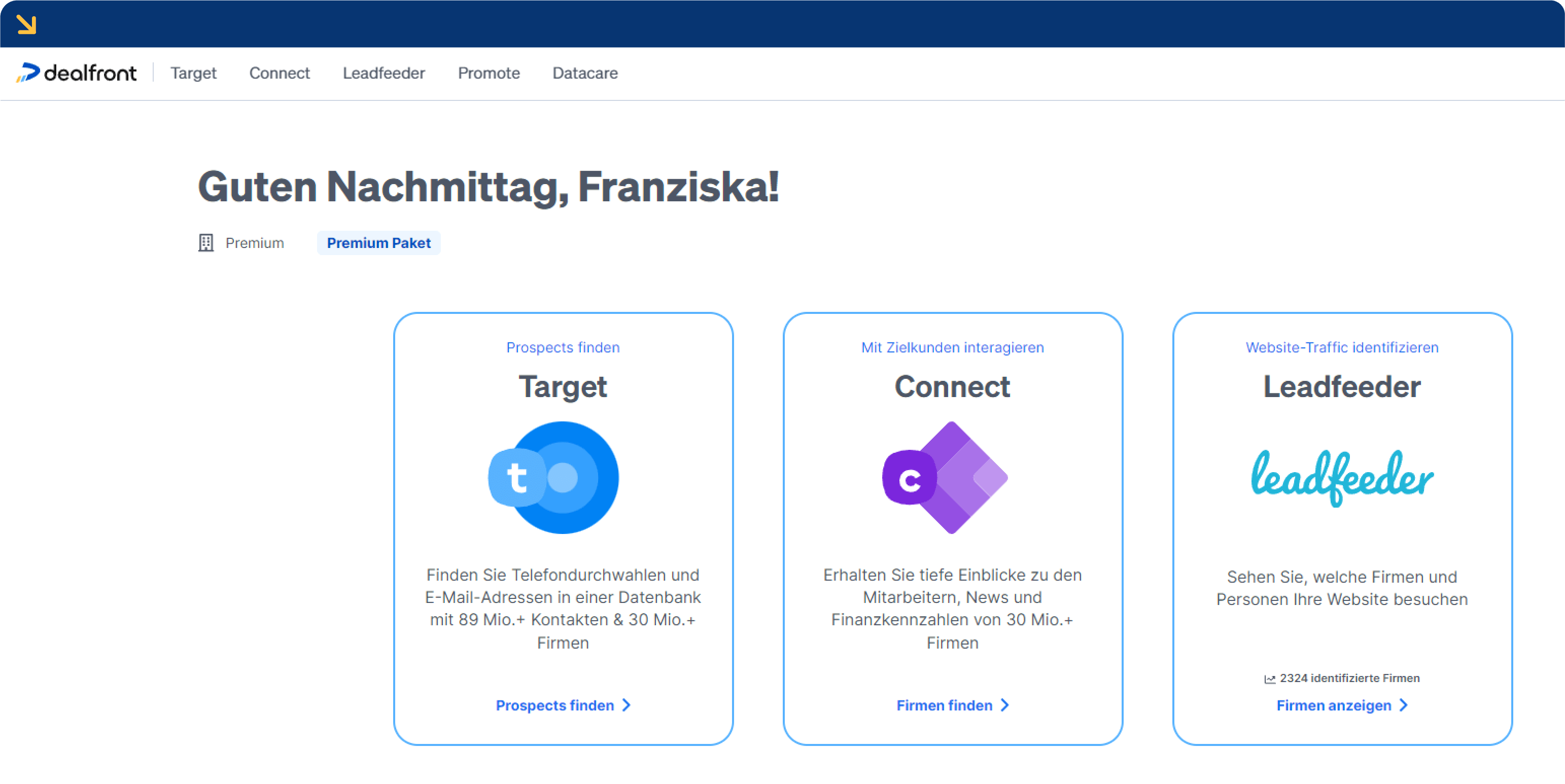
Example of a Sales Intelligence tool: Dealfront
SI tools collect and analyze relevant marketing data from across the web, presenting it in a user-friendly format. These tools are often powered by AI and machine learning, allowing them to keep information up to date and provide additional insights, such as trigger events like company expansions. Unlike traditional address lists, these tools use crawling technologies which allow them to offer dynamic, flexible data that adjusts to real-time changes among your potential customers.
As already mentioned, these tools can save you a significant amount of time and money. They also provide you with B2B address data that you might not have discovered otherwise. Sales Intelligence tools offer so much more detail than traditional marketing lists, and give you a much richer view of your potential customers.
Another advantage is that many of these tools can be integrated into existing CRM systems. This allows you to work more efficiently without having to switch between different tools.
Our recommended tool: Dealfront
The Dealfront Sales Intelligence Platform goes far beyond just buying addresses. It provides you with an intelligent B2B database containing over 180 million contacts and more than 40 million companies across Europe. This means that in addition to comprehensive company search capabilities, you can also access advanced features like B2B lookalikes, trigger events and lead alerts. These features allow you to find companies similar to your best customers and ensure you never miss the perfect moment to reach out or secure a lead.
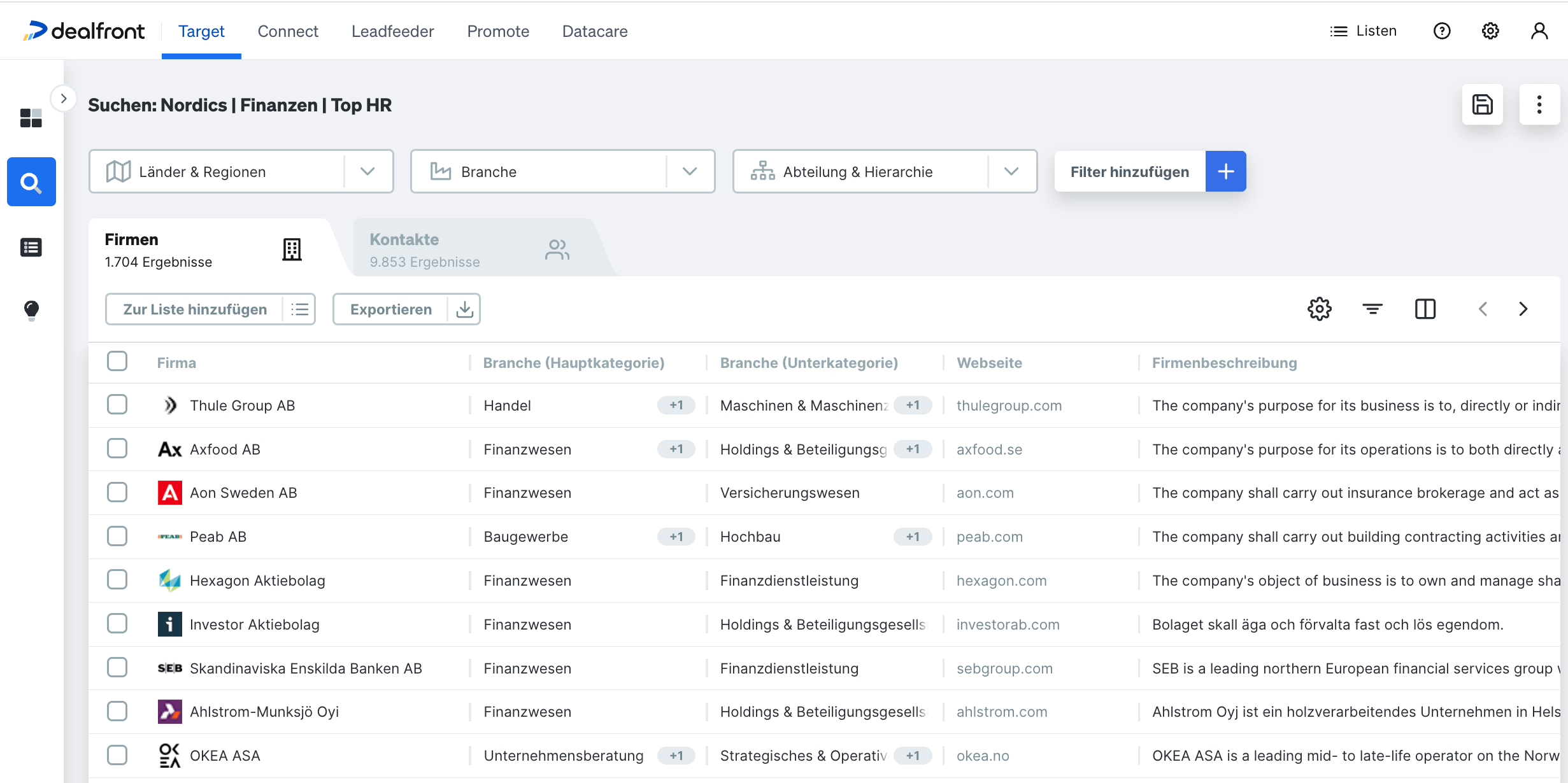
The tool at a glance: Using search filters in Dealfront
Best practices for buying B2B business address lists
If you’re planning to purchase address lists, it’s crucial to carefully evaluate your options and consider the following factors:
1. Buy up-to-date addresses
Address information is only useful if it’s correct. Ensure that the B2B addresses you purchase are current and accurate, especially if you’re considering lower-priced options. Data that is older than a few months old may no longer be relevant, which means you may wind up wasting time reaching out to companies that have relocated.
2. Ensure compliance with legal regulations
Don’t forget that data protection regulations like the European Union’s General Data Protection Regulation (GDPR) also apply to B2B sales activities. In the EU, for example, any time you process personal data, such as an address, you have to do so in compliance with the GDPR. That means you also need a legal basis for processing personal B2B data. If you use personal data without a legal basis, it is illegal and may face penalties, including fines, if you get caught.
When it comes to processing B2B data in the EU, the only legal basis is Article 6(1) lit. of the GDPR, which states that companies may process data if they have a “legitimate interest” to do so.
You can only invoke the “legitimate interest” clause whenever:
Your company has a legitimate reason for processing personal data, and
Your company’s interest in processing the data outweighs the individual’s interest in protecting their privacy (balancing of interests).
To remain fully compliant with data protection regulations, you can use data that is publicly available, for example, from public registers. Of course, if you’re operating in the EU, you still always have to carry out and document the balancing of interests required under the GDPR on a case-by-case basis. The likelihood that the required balancing of interests will be in your favor is much higher if the data you’re using is a matter of public record.
Watch out though as some B2B address list providers offer private phone numbers for contacts. While it may seem tempting to have access to that kind of data, be very careful before you buy it. If you don’t know exactly how the provider obtained this data or don’t have the individual contact person’s consent, there’s a strong chance that you don’t have a valid legitimate interest in using that data. In other words, if you collect or use that data, you’re breaking the law.
In addition to international regulations like the GDPR, it’s also important to check country-specific laws for cold calling. Depending on how you intend to use the addresses, you may need to comply with additional rules. In Germany, for example, this is regulated by the Law Against Unfair Competition (UWG).
Please note that this article is written for editorial purposes and is not intended to serve as legal advice. It is your responsibility to ensure that the data you use complies with applicable laws and regulations.
3. Only buy relevant data
Which data is relevant to you? Before purchasing, make sure the provider can actually deliver the information you need. For example, what use is a company name and address if your sales efforts rely heavily on online marketing (such as blog posts, B2B ads, email marketing or social media)? In that case, you’d be missing crucial details. When reaching out to a company you’re unfamiliar with, it’s essential to know who the right contact person is or how large the company is. The more information you have, the better you can determine whether the company is a good fit for your services.
4. Look for flexible filtering options
When buying B2B addresses, you’re typically dealing with static data, which can quickly become outdated. In contrast, Sales Intelligence tools offer dynamic data that updates automatically, providing you with the most current information. This flexibility is crucial for maintaining the accuracy and relevance of your contact lists.
Sales Intelligence tools like Dealfront also allow you to apply advanced filters beyond basic parameters like company size or location. For example, you can search for companies based on specific keywords found on their websites, helping you identify the most relevant prospects and tailor your outreach accordingly.
FAQs: Buying B2B address lists
Is it expensive to buy B2B addresses?
There’s a wide range of prices out there when it comes to buying company addresses. Opting for the cheapest option isn’t always the best choice, as these often contain outdated or incorrect B2B addresses. The cost generally depends on your specific needs—the more detailed the information you want about a company, the more expensive it will be to purchase those addresses.
It's crucial to know what information you need to contact a company effectively. If you only receive the address and company name, your outreach will likely be very impersonal, reducing your chances of getting a response.
Once you’re clear on the specific information you need and your budget, you can request it directly from the address broker.
Is it legal to buy company addresses for B2B sales?
In general, any time a company processes personal data, including in the B2B sector, it must have a legal basis under any data protection regulations that apply. Under the European Union’s GDPR, for example, when a company purchases and processes B2B addresses, the “legitimate interest” provision typically serves as the legal basis, which explicitly includes sales and marketing activities.
Just remember to always conduct a balancing test on a case-by-case basis to ensure that your interest in processing the data outweighs the individual’s right to privacy.
It’s important to note that the GDPR applies only to personal data. Purely corporate data without any personal connection is generally not subject to these regulations, so you can process that kind of data without any worries. However, if the data includes personal details, such as names and email addresses, you must be sure to follow any data protection regulations that apply in your country.
Some regulations, such as country-specific e-Privacy laws, also dictate how and when you can contact individuals via email, social media or phone. These rules vary by country, so be sure to always check local regulations when using purchased company and contact data for B2B lead generation and acquisition. Failure to comply with these regulations could result in heavy fines.

Can I buy email addresses only?
At first, it might seem like a good idea to just buy email addresses instead of postal addresses. After all, most B2B interactions happen via email, so why pay for information you don’t need?
But there are actually some good reasons to buy postal address information along with email addresses:
As a minimum, you should have contact information like the company name or the contact person’s name. This allows you to respond quickly if you get a reply and to reach out to decision-makers at just the right moment with a personalized message.
Depending on which country you’re operating in, sending promotional emails without explicit consent is prohibited by law. In the EU, for example, consent is generally obtained through a double opt-in process.
So, in short, buying email addresses only is risky. Sending the same generic message to a large number of addresses can easily be flagged as spam, which could lead to warnings or penalties. Plus, the success rate with this approach is usually very low.
Why not try a postal marketing campaign? Sending cold contact mail to companies is legal in most countries and it’s a great way to stand out from the crowd. After all, not many companies are using mail campaigns these days.
Conclusion: Why buy addresses when you can stream B2B data?
Buying company addresses might have been an easy way to expand your database in the past, but most leading sales teams now consider it to be an outdated strategy. A more modern, efficient and effective approach is using Sales Intelligence tools like Dealfront which lets you stream high-quality B2B data exactly when you need it.
There's no reason to stick with static, inflexible and error-prone B2B address lists. With advanced software solutions like Dealfront, you get access to powerful features like trigger event notifications, B2B lookalikes and lead alerts. These tools help you boost your lead generation and close more deals.
On top of that, Dealfront offers a suite of tools that can make your marketing and sales efforts smarter. You can filter companies by specific criteria, get alerts when there’s a management change, and much more.
Ready to modernize your B2B sales activities? Skip the address lists and start streaming real-time Sales Intelligence today!
